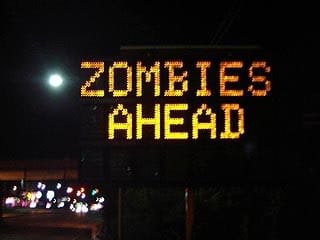California: the zombie state


It certainly seems that way sometimes, doesn't it? The California legislature shambles around, bumping into things, with no apparent sense of direction. Issues that managed to get resolved quickly in other states (like Utah revising their public pension plans in one year flat) take ponderously interminable amounts of time for California to even start pondering them.
This certainly seems zombie-like to me, and also to economist William Watkins of California Lutheran University. He says California is in serious danger of falling behind, both nationally and in global commerce. High taxes, overgrown thickets of regulations, a decaying infrastructure, and substandard education are among the problems creating a permanent underclass and an environment seriously unattractive to massive investments. If a company is thinking of spending $200 million to build a new assembly plant, do you think their first choice will be a state with an unbalanced budget and abysmal credit rating? I'm guessing not.
But California shambles on. Surf's up, the sun is out, and the Promised Land seem to be the implicit belief. Therefore, these current troubles must just be little speed bumps before the economy comes roaring back again and Cali regains its former glory. Well, maybe not. Some think California could be in for a decade or two more of economic stagnation. This would mean that the current severe budget cuts will look minor in comparison to the governmental downsizing that will follow, and California would become another Michigan. Michigan? Say it ain't so!
Where will the recovery and growth come from? I don't see any economic engine that will power a recovery except maybe cleantech. But cleantech can't possibly carry the whole state.
Maddeningly there's no sense of urgency about solving these problems, especially not at the state level. The shambling of the zombies continues. The Supreme Court recently ruled that California must release tens of thousands of inmates because of chronic and unconstitutional overcrowding. California has known since a court decision in 1996 that a ruling like this could happen. Instead of being proactive and fixing the overcrowding, it - you guessed it - shambled around for 15 years instead. Even more disconcertingly, Gov. Brown seems positively cheery about the ruling because it gives him an excuse to transfer the inmates to counties and let them deal with it. The counties of course are utterly unprepared to handle a huge influx of new inmates.
This kind of short-sighted approach, where problems are ignored until they fester, then kicked someplace else for someone else to deal with, is a primary reason why California is becoming zombie-like.


